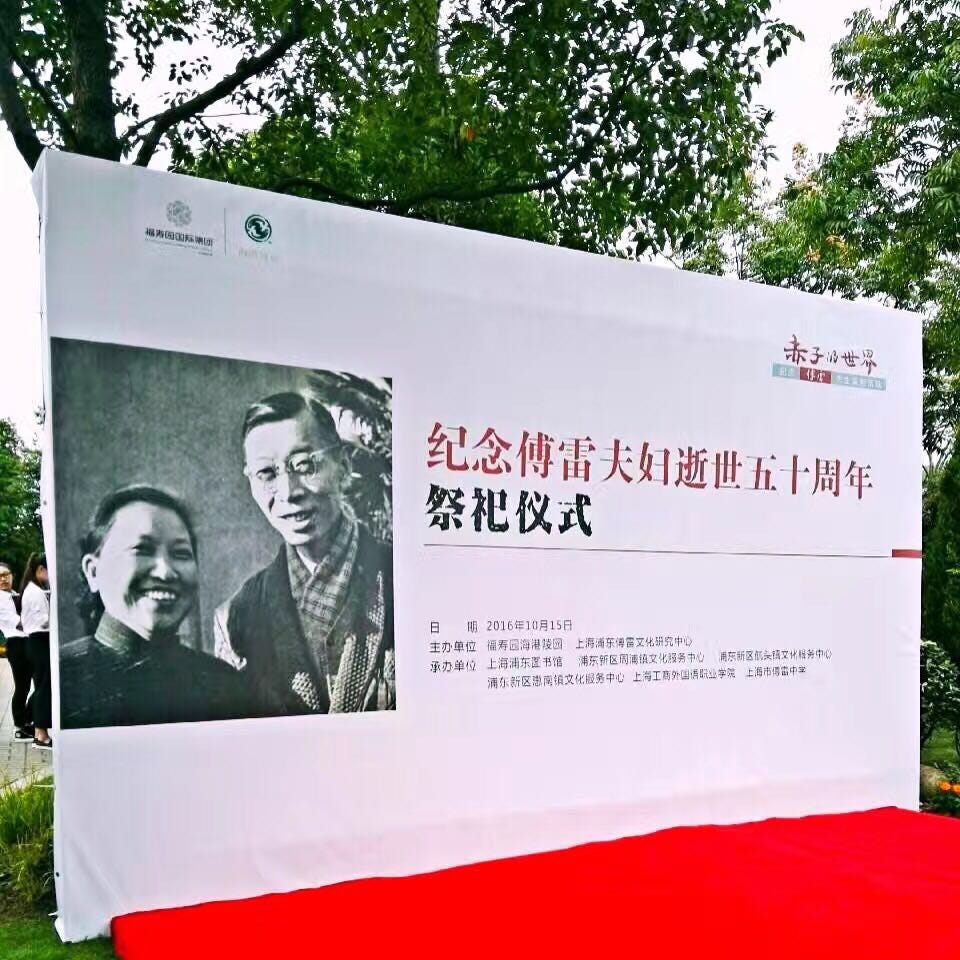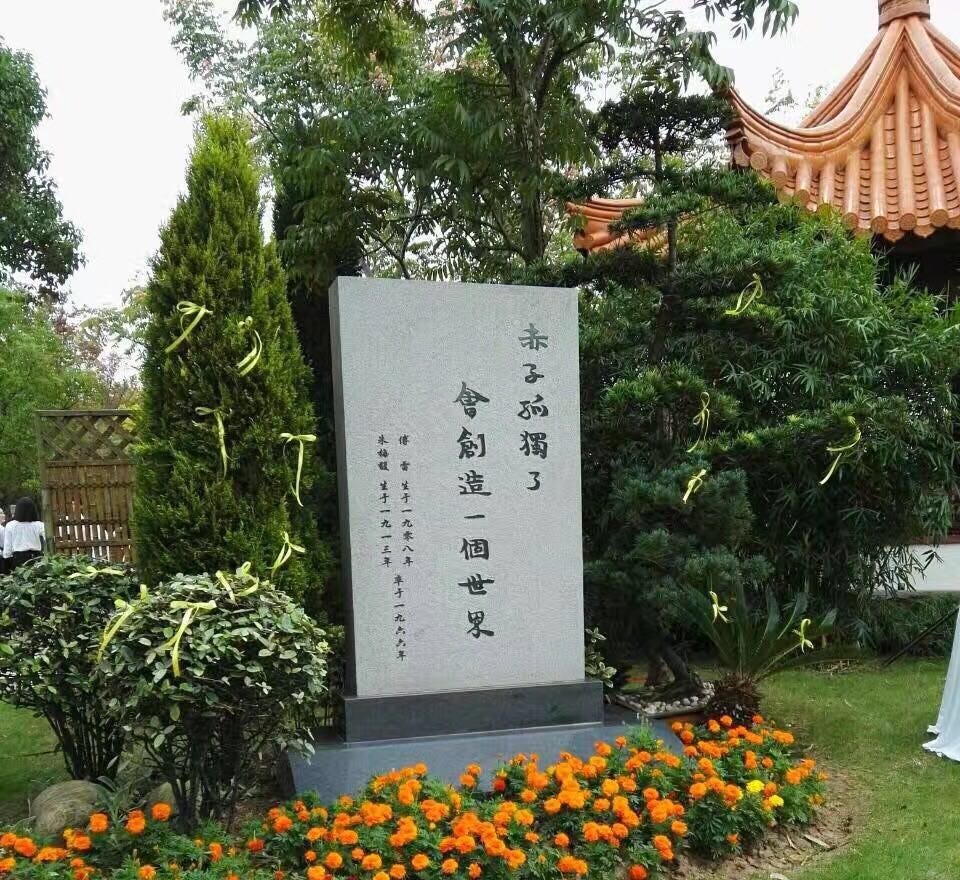Guangchen Chen, Ph.D. candidate in Comparative Literature and 2016–17 Fairbank Center Graduate Student Associate, describes an event that signaled the start of the Cultural Revolution’s horrors and led to a suicide.

2016 marks the 50th anniversary of the beginning of the decade-long Cultural Revolution, one of the most consequential events in modern Chinese history. And so far the most conspicuous commemoration of it has been, ironically, the very lack of any official commemoration in mainland China. In light of this, an event that took place October 15–17 in Pudong, Shanghai, has special significance: under the auspices of Fu Lei Culture Research Center, a three-day event commemorated the 50th anniversary of the suicides of Fu Lei and his wife Zhu Meifu, shortly after the onset of the Cultural Revolution. The fact that this commemoration actually took place in this sensitive year is remarkable in itself.
Born in 1908, Fu Lei was an influential translator of French literature and art critic. Having studied at the University of Paris in late 1920s and early 1930s, he spent most of his life in Shanghai. His most widely-known contributions include fifteen of Balzac’s novels, and works by Voltaire and Prosper Mérimée, and most notably an influential Chinese rendition of the Nobel laureate Romain Rolland’s Beethoven-inspired novel Jean-Christophe, granting the work an iconic status in China that it has not enjoyed in its native France.

But Fu Lei’s achievements went far beyond the field of translation. His essays on art, literature and music are distinguished by sharp critical insight and unerring taste. For example, he was among the very first to recognize the talent of Eileen Chang, but also mounted a serious critique of her limitations. He was the lonely Chinese champion of the short-lived composer Tan Xiaolin, one of Paul Hindemith’s favorite students. He also had close and highly symbiotic friendships with such towering figures as Qian Zhongshu, Yang Jiang, and Stephen Soong. Mostly significantly, he single-handedly brought the then relatively obscure painter Huang Binhong to national prominence.
However, Fu Lei’s intellectual life was dealt a severe blow in 1957: during the Anti-Rightist Movement, his criticism of the government was interpreted as a “vicious attack.” Eventually, after three days of humiliation and torture by the Red Guards at the beginning of the Cultural Revolution, Fu Lei and Zhu Meifu committed suicide on September 3, 1966, his “capitalistic” artistic taste being one of his many “crimes.”

Why did this obviously meaningless and unnecessary tragedy, among hundreds of similar ones, happen to such a great cosmopolite at all? In response, I would like to stress that, from the Cultural Revolution’s own logic, this was neither meaningless nor unnecessary: Fu Lei was in fact precisely the kind of person the Cultural Revolution targeted. His persecution was not an accident; nor was Cultural Revolution, or more precisely, “the removal of the life of culture,” a misnomer. For different people, the Cultural Revolution has different meanings; perceptions within and outside China may vary drastically, and the remarkable following it inspired in 1960s and 1970s France is something we should always keep in mind. But one thing is certain: the communist revolution in economic and political realms, driven by a dream of absolute equality, spilled over into the cultural realm, resulting in a fanatic anti-intellectualism.
“The communist revolution in economic and political realms, driven by a dream of absolute equality, spilled over into the cultural realm, resulting in a fanatic anti-intellectualism.”
Luckily, Fu Lei had an unexpected posthumous influence on China. Under his mentorship, his son Fou Ts’ong became a promising pianist; while studying in Poland under China’s sponsorship, he achieved international prominence by winning prizes in the 1955 Chopin Competition. But in 1959, under severe political pressure, Fou Ts’ong abruptly left Warsaw for London, effectively cutting off his ties to China to avoid persecution. This also meant that he would never to able to see his parents again.
In this painful context, Fu Lei wrote nearly two hundred letters to his son, until the former’s suicide. After the end of the Cultural Revolution, they were published posthumously as Fu Lei’s Family Letters. Full of tenderness and sincerity, these letters have become a bestseller in China, and played a crucial role in rehabilitating the values shattered by the Cultural Revolution. They were also a focus in the symposium this past October, as they are currently being translated into English for the first time. The project, spearheaded by the Fu Lei expert Serena Jin of the Chinese University of Hong Kong, benefits from contributions from the scholar Louis Lee, and most notably John Minford, the translator (together with David Hawkes) of the definitive Penguin edition of The Dream of the Red Chamber. With one of the most brilliant translators of our time translating the writings of his great predecessor, this project promises to represent the art of translation at the highest level.
“From the Cultural Revolution’s own logic, this was neither meaningless nor unnecessary: Fu Lei was in fact precisely the kind of person the Cultural Revolution targeted.”
Speaking at the symposium, Minford stressed that this was a very sad occasion, and what we were commemorating was a serious, sincere and patriotic intellectual who was betrayed by his own country. Having been immersed in Chinese classics such as the I-Ching and especially Mencius, Minford sees Fu Lei as part of the philosophical genealogy in the great Confucian tradition. The value that Fu Lei cherished most was Mencius’s “a childlike heart” (赤子之心), which Minford identified as one with “the human heart” (人心) and ultimately “the Dao heart” (道心). With such a purity of heart, Fu Lei devoted himself to the building of a new China, and these letters detail his serious, persistent albeit difficult and ultimately unsuccessful effort of grappling with its ideology. In this sense, Minford regarded Fu Lei’s letters to have a significance comparable to the works of Aleksandr Solzhenitsyn.

Today, the unique meeting of two great minds of Fu Lei and Fou Ts’ong is compromised by the fact that Fou Ts’ong’s replies were destroyed during the Cultural Revolution, effectively turning the father-and-son conversation into a monologue, which serves as a poignant reminder of the tragic historical circumstances. But the autobiographical monologue is enhanced by letter-writing’s private and intimate tone, and therefore has more truth and sincerity than fictions.
Fu Lei eventually failed, completely and fatally, to grasp the new ideology, just like many of the other great intellectuals China produced in the first half of the twentieth century. Whether the fault lied with Fu Lei or the ideology is a question that should best be addressed to those people — which include quite a few notable scholars — who still think positively of the Cultural Revolution despite its terrible atrocity, as if it was an unfortunate but inevitable, and hence somehow worthwhile side effect. Fu Lei’s death thus serves as a stark reminder that this atrocity was by no means an accidental byproduct, but part and parcel of what this Revolution, with its ultra-leftist cultural agenda, deliberately attempted to achieve.
Guangchen Chen is a Ph.D. candidate in Comparative Literature, and a 2016–17 Fairbank Center Graduate Student Associate.


